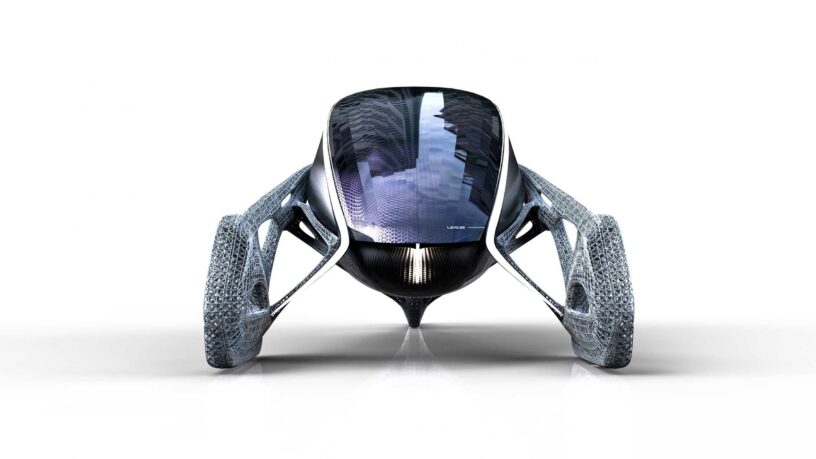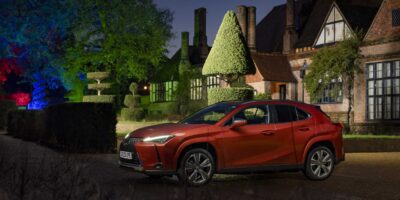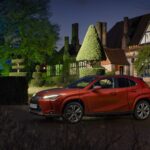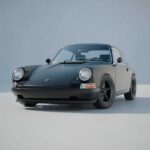Cars that change their colour with the seasons, personalised Vtols that can dock with buildings, and tessellated pods that can combine with other vehicles in an urban swarm are just some of the RCA students’ mould-breaking visions of what future luxury mobility might look like in the year 2040, produced in a creative challenge sponsored by premium car brand Lexus.
Post-graduate students studying on RCA’s Intelligent Mobility MA in the Intelligent Mobility Design Centre at Royal College of Art (RCA) have produced a series of radical new luxury transport concepts in a creative programme, Lexus 2040: The Soul of Future Premium, as part of their studies.
The challenge was to explore new vehicle architectures to meet changes in European city life, society and demographics and to re-imagine the role the Lexus brand might play in region’s mobility landscape beyond the next two decades.
The shortlisted projects
2040 Lexus Vision In-season, by Bangning An
This project creates a vision of future luxury mobility that is highly in sync with the season. It centres on the Japanese proposition ‘Ichi-Go, Ichi-E’, which is about paying attention to everyday moments. To help Generation Z rediscover seasonal changes in urban areas, the vehicle’s intelligent crafted roof controls the intensity of daylight coming into the interior to achieve an immersive seasonal experience and better energy efficiency. The vehicle’s colour scheme would also change with the seasons.
Crucible, by Benjamin Miller
The Crucible is a hydrogen-fuelled escape vehicle that divides itself to meet different use scenarios and contexts. It separates the owned luxury cabin from the technology to create a service that is both carefree and personalised.
Miller combined shared ownership with the flexibility of an owned vehicle interior, as people reconsider how they live and work in 2040. The morphing interior can adapt to any configuration for seamless comfort and could even be put inside your house. Users could choose a different vehicle for weekdays and for weekends when they want to explore and meet others. In reference to Lexus design cues, Miller reinterpreted the Lexus spindle grille and created a light and airy vehicle that is easy to get in and out of, and that can be reclined for comfort.
ALTO, by Richard Newman
ALTO is a VTOL (vertical take-off and landing) vehicle. It is designed for a time when a premium experience will mean the ‘celebration of the everyday,’ as an antidote to a future that will be overloaded with tech that no longer be seen as luxury. Newman’s distinctive hydrogen-fuelled, pendant-style airborne vehicle is described as ‘jewellery in the sky – like a cloud’s earring,’ and is a cross between a plant terrarium and a hot air balloon. The top of the vehicle could be personalised like a ring, to feature different ‘stones.’ Its architecture would include unified cladding so the vehicle could dock onto the side of buildings.
Lexus UrbanSwarm, by Maxime Gauthier
UrbanSwarm gives a sense of luxury to an everyday urban mobility experience to ensure transportation with more fluidity. This modular and seamless way to travel provides the flexibility and convenience of micro-mobility with the efficiency of mass transportation systems through its tessellation feature in which it can link with other ‘pods’, while ensuring full inclusivity for all.
Lexus NEKO, by Jan Niehues
Lexus NEKO is a micro-mobility concept that delivers a great experience on demand, inspired by Japanese culture and by nature, with an insect-like exoskeleton. It is a BEV with sensor cameras and an intelligent recording device. It can operate in two modes: one for conventional driving as an independent vehicle; the other a sharing mode where the occupants can view scenery recorded on previous journeys for an Instagram experience on a grand scale. It uses 4D technology for optimised ergonomics and Lexus branding opportunities. For example, the vehicle can perform traditional Japanese bowing, while microbots allow complete flexibility for speed in urban areas.
Lexus #Units, by Zhenyu Kong
In the context of digital personalisation as a future social space, #Units not only expands the connection between individuals and groups, it also explores what sharing luxury might be, using digital technology. It caters for Generation Alpha’s desire for diversity in self-expression, tapping into the popularity of social media for sharing of opinions and emotions. It is a luxury sharing space, as on arrival at a destination the vehicle can link virtually to other vehicles where it can be used as a projector device, eg to join concerts or parties virtually. The vehicle’s unique design takes its inspiration from the shape of coastal barriers. It is also highly flexible and can reduce its footprint to adapt to narrow roads. The interior can also be personalised using blockchain technology, so NFT artworks can be brought on a journey.
Finalists’ exhibition
The Lexus design challenge inspired original work from 20 postgraduate students on RCA’s Intelligent Mobility MA in the Intelligent Mobility Design Centre, an interdisciplinary centre of design and research excellence. The students have been mentored by Ian Cartabiano and Lance Scott, respectively President and General Design Manager at ED2, Lexus’ European design centre, together with Professor Dale Harrow, Chair of the IMDC, and Dr Chris Thorpe, the Intelligent Mobility Head of Programme.
Each of the six finalists will now develop and refine their concept with the benefit of the judges’ professional advice. On 15 March, their work and the other students’ presentations will go on public display in an exhibition at the RCA’s new landmark Battersea campus in London, where the three winning projects will be announced.
President of ED2 Ian Cartabiano said: “We were very impressed by the breadth of creativity and innovation shown by all the designers. They demonstrated skill and imagination in bringing together their ideas for future mobility and vision of how the concept of Lexus premium quality might evolve.”
Prof Harrow commented: “The staff and students from RCA Intelligent Mobility are delighted to have collaborated with Lexus on The Soul of Future Premium. The project has provided an exciting and challenging context in which to explore future mobility with a premium global brand
*Article Source media.lexus.co.uk








